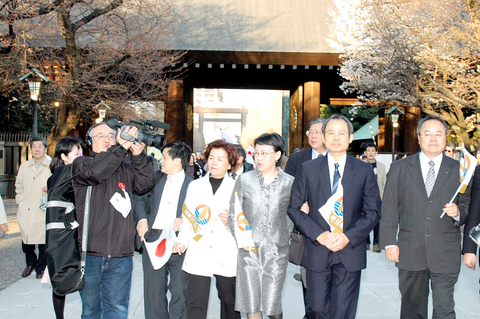Taiwan Solidarity Union (TSU) Chairman Shu Chin-chiang (
Shu immediately came under fire at home for the visit where he was accused of dignifying Japan's militarism in the early 20th century.
Shu, dressed in a business suit, was cheered on by supporters who unfurled the flags of Japan and his party as he entered the Yasukuni shrine which is dedicated to 2.5 million war dead, including 14 convicted war criminals.

PHOTO: CHANG MAO-SANG, TAIPEI TIMES
He called on Asians to "move beyond the grudges and animosity of the past."
"As one Taiwanese and as a leader of a political party I have come here to pay my respect to the soldiers who sacrificed their lives for Japan," Shu said.
"At the same time, as one Taiwanese, I have come here to pay my respect for 28,000 Taiwanese," whose names are enshrined, he said.
Supporters said it was the first known visit to Yasukuni in modern times by a party leader from Taiwan, which was ruled by Japan from 1895 to 1945.
Pilgrimages by Asian leaders are extremely rare to the Shinto shrine in central Tokyo, although military envoys and attaches from countries in other regions have often paid visits.
China has refused any bilateral visits with Prime Minister Junichiro Koizumi over his visits to the shrine.
"Chinese thinking and perspectives don't represent those in Asia. And more so, they don't reflect the views of Taiwan," Shu said. "As a Taiwanese, I don't agree that China still harbors a grudge."
"I wanted to stress this point that the way every nation mourns its war dead should be respected," he said.
The Yasukuni shrine controversially lists the names of 28,000 Taiwanese and 21,000 Korean soldiers, most of whom were forced into service under Japan's colonial rule.
The holy site also lists the names of Japanese civilians who died in fighting.
The populist Koizumi has visited the shrine four times since August 2001, saying he has the right as a Japanese person to choose how to honor the dead.
His visits have triggered furious protests from China and South Korea and led to a string of unsuccessful lawsuits by Asians bereaved in World War II who accused Koizumi of causing them emotional distress.
In Taipei, Aboriginal legislator Kao-Chin Su-mei (
"Japan launched over 160 battles to destroy Taiwan's Aboriginal tribes during its 51-year colony on the island," he said in a statement.
"We strongly protest the TSU visiting the Yasukuni Shrine," he said. "It is already an insult to Taiwan's Aboriginal people that our soldiers were enshrined there."
TSU spokesman Chen Chien-ming (
"We do not agree with the acts and invasions of the Japanese militarism [during World War II] but we should not let hatred persist," Chen said in Taipei.

South Korean K-pop girl group Blackpink are to make Kaohsiung the first stop on their Asia tour when they perform at Kaohsiung National Stadium on Oct. 18 and 19, the event organizer said yesterday. The upcoming performances will also make Blackpink the first girl group ever to perform twice at the stadium. It will be the group’s third visit to Taiwan to stage a concert. The last time Blackpink held a concert in the city was in March 2023. Their first concert in Taiwan was on March 3, 2019, at NTSU Arena (Linkou Arena). The group’s 2022-2023 “Born Pink” tour set a

CPBL players, cheerleaders and officials pose at a news conference in Taipei yesterday announcing the upcoming All-Star Game. This year’s CPBL All-Star Weekend is to be held at the Taipei Dome on July 19 and 20.

The Taiwan High Court yesterday upheld a lower court’s decision that ruled in favor of former president Tsai Ing-wen (蔡英文) regarding the legitimacy of her doctoral degree. The issue surrounding Tsai’s academic credentials was raised by former political talk show host Dennis Peng (彭文正) in a Facebook post in June 2019, when Tsai was seeking re-election. Peng has repeatedly accused Tsai of never completing her doctoral dissertation to get a doctoral degree in law from the London School of Economics and Political Science (LSE) in 1984. He subsequently filed a declaratory action charging that

The Hualien Branch of the High Court today sentenced the main suspect in the 2021 fatal derailment of the Taroko Express to 12 years and six months in jail in the second trial of the suspect for his role in Taiwan’s deadliest train crash. Lee Yi-hsiang (李義祥), the driver of a crane truck that fell onto the tracks and which the the Taiwan Railways Administration's (TRA) train crashed into in an accident that killed 49 people and injured 200, was sentenced to seven years and 10 months in the first trial by the Hualien District Court in 2022. Hoa Van Hao, a